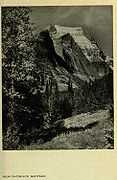Going-to-the-Sun Mountain
| Going-to-the-Sun Mountain | |
|---|---|
 Going-to-the-Sun Mountain center right | |
| Elevation | 9,642 ft (2,939 m)[1] |
| Prominence | 1,892 ft (577 m)[2] |
| Location | |
| Location | Glacier National Park, Glacier County, Montana, U.S. |
| Range | Lewis Range |
| Coordinates | 48°41′46″N 113°38′21″W / 48.69611°N 113.63917°WCoordinates: 48°41′46″N 113°38′21″W / 48.69611°N 113.63917°W |
| Topo map | USGS Logan Pass |
| Climbing | |
| First ascent | 1907 |
| Easiest route | Hike, scramble class 4 |
Going-to-the-Sun Mountain (9,642 feet (2,939 m)) is located in Glacier National Park (U.S.) and rises dramatically above St. Mary Valley just north of the Going-to-the-Sun Road. The mountain was named by James Willard Schultz in 1888.
Origin of name
During the winter of 1887-1888, James Willard Schultz, an early hunting guide in the St. Mary Lakes region and his family built a cabin on the north shore of Upper St. Mary Lake. While hunting on Red Eagle Mountain with his Pikuni friend, Tail-Feathers-Coming-Over-the-Hill, gave this mountain the name it bears today. Warren Hanna, Schultz’s biographer describes the naming thus:
It was during this winter that Schultz and Tail-Feathers-Coming-Over-the-Hill killed a bighorn ram on Red Eagle Mountain. When they finished butchering it, they build a small fire and sat down beside it for a leisurely smoke. As they took turns puffing on Tail-Feather’s long-stemmed black stone pipe, Schultz noticed that his friend was gazing constantly at a particularly beautiful mountain across the lake. Finally, he commented to Schultz: How very high it is, its summit far up into the blue. Of all the mountains that I have ever seen I think it is the most beautiful. Were I younger and were it summertime, how I would like to climb up and lie on its summit, and fast, and pray Sun for a vision. Schultz, too, had admired that particular peak and had considered it the finest in the area. Often he had tried to think of a name for it that would be fitting, and now Tail-Feathers had given him an idea. The mountain should have some relationship to Sun, the most important of all the gods of the Blackfoot tribe. After pondering the matter for a while, Schultz turned to Tail-Feathers and said: We will name that mountain. Let us call it Going-to-the-Sun Mountain. With which suggestion Tail-Feathers was in complete accord, saying Good, That is a powerful, sacred name; it could not have a better one.— Warren Hanna, The Life and Times of James Willard Schultz, 1986[3]
Alternatively, numerous Blackfeet Indian legends are credited with the origins of the mountains' name. Used by the Blackfeet as a location for vision quests, it is one of the most accessible major mountain peaks in Glacier National Park. According to several sources, the actual Blackfeet name for the mountain is The-Face-of-Sour-Spirit-Who-Went-Back-to-The-Sun-After-His-Work-Was-Done Mountain, in explanation of the snowfields on the mountainside which, as viewed from the west, make the outline of a face.
| Images of Going to the Sun Mountain | |||||||||
|---|---|---|---|---|---|---|---|---|---|
| |||||||||
See also
Notes
- ↑ "Going-to-the-Sun Mountain, Montana" (Map). My Topo (USGS Quads). Retrieved 2010-05-02.
- ↑ "Going-to-the-Sun Mountain, Montana". Peakbagger.com. Retrieved 2010-05-02.
- ↑ Hanna, Warren L. (1986). The Life and Times of James Willard Schultz (Apikuni). Norman, Oklahoma: University of Oklahoma Press. p. 167. ISBN 0-8061-1985-3.
- ↑ Holtz, Mathilde Edith; Bemis, Katharine Isabel (1917). Glacier National Park: Its Trails and Treasures. New York: George H. Doran.
- ↑ Holtz, Mathilde Edith; Bemis, Katharine Isabel (1917). Glacier National Park: Its Trails and Treasures. New York: George H. Doran.
Further reading
- Edwards, J. Gordon (1991). A Climbers Guide to Glacier National Park. Falcon. ISBN 0-87842-177-7.


